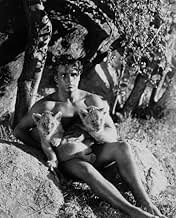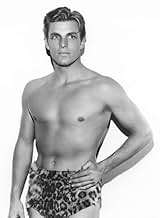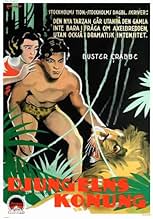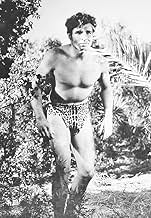NOTE IMDb
6,2/10
259
MA NOTE
Ajouter une intrigue dans votre langueA white youth who is raised in the jungle by the animals is captured by a safari and brought back to civilization as an attraction in a circus.A white youth who is raised in the jungle by the animals is captured by a safari and brought back to civilization as an attraction in a circus.A white youth who is raised in the jungle by the animals is captured by a safari and brought back to civilization as an attraction in a circus.
- Réalisation
- Scénario
- Casting principal
Douglass Dumbrille
- Ed Peters
- (as Douglas Dumbrille)
Ronnie Cosby
- Kaspa at age three
- (as Ronnie Cosbey)
Robert Adair
- John C. Knolls
- (non crédité)
Florence Britton
- Mrs. Edith Knolls
- (non crédité)
Don Brodie
- Reporter
- (non crédité)
Leonard Carey
- Clerk at Hunting License Bureau
- (non crédité)
Nora Cecil
- Spinster in Park
- (non crédité)
Avis à la une
This 1933 pre-code antique is a delight on several levels. For once, it's a jungle movie from the early thirties when MGM's Johnny Weismuller was bringing in the money as that studio's Tarzan. So, Paramount wanted some of the jungle action and created this very enjoyable variation of the wild boy raised in the jungle by wild animals.
I've always felt Buster Crabbe was terribly under-rated. Here he is in all his near naked glory as Kaspa, the Lion King. We're never really explained as to how he escaped a wrecked plane and managed to grow up into this radiant Adonis but since this movie was made before the production code, we get to see lots of Buster since he wears a bikini sling-shot so abbreviated that he really is virtually naked, except for his rear-end. In fact, the movie's ads were aimed primarily at the women audience members at their chance to see a beautiful Adonis in the near altogether as this jungle god.
The cast is surprisingly strong with excellent production values, camera work and editing. The best part of the movie by far is the huge circus fire at the end. Not sure how they did this but the fleeing circus patrons look genuinely terrified and Buster is in his glory as he breaks through the police lines to rescue his beloved cats.
There is naturally a love story to all this and Francis Dee makes a delightful choice as a school teacher who see's the real potential of this jungle boy when he invades her apartment. She takes him under her wing and travels with the circus to support and educate him.
This was Buster's first movie, fresh from winning major swimming olympic awards and his natural beauty is spell-bounding. His torso is beautifully proportioned, he sports a thick head of dark curls and his face is as innocent and boyish as one would expect of a young male suddenly thrust from the jungle into the wilds of a big city.
This quality of wide-eyed innocence is what new audiences are discovering about Buster Crabbe as they watch him in "Flash Gordon", his various serials and especially another jungle yarn, "Tarzan the Fearless" in which he reprises his identical bikini slingshot and makes a very appealing young Tarzan.
Paramount's answer to Tarzan, with Olympic athlete Buster Crabbe as a child raised to adulthood by a pride of lions. The expected complications result when Buster and his furry pals are transported to a circus. Charmingly clumsy in its early scenes, the film builds to an exciting, fiery conclusion. Animal activists will wince at a brutal battle between some big cats, but otherwise it's very entertaining.
During the 1930s-60s, Hollywood made a ton of Tarzan and Tarzan knockoff movies. A few of the Tarzan films (especially the ones with Johnny Weissmuller) were excellent...and most of the rest were pretty crappy...particularly the knockoffs. These knockoff and crappy Tarzan pics abound with terrible stock footage (often of animals not even native to Africa) and the plots are, to put is charitably, pretty dull. In light of this, I was shocked how much I enjoyed "King of the Jungle", a knockoff all the way...but a wonderful knockoff.
The story starts out pretty much like Tarzan. Some parents bring their very young child to the African savannahs in order to go sightseeing. However, they are killed and the child is but a toddler. But instead of apes adopting the child, it's adopted by a lioness!! Now don't start complaining about how 'that's not possible'....it's not like it's very likely gorillas would successfully raise a child either!
The child grows into a man (Buster Crabbe) and he is at home with all the lions. However, when some folks come to the savannah looking for lions, they accidentally also capture the young man. He is given the name 'Kaspa the Lion Man' and is taken to America in a cage!! Not surprisingly, he soon escapes but manages to meet a nice lady (Frances Dee) and she is able to convince him to go back with the folks...and she is hired to take care of him. Soon, Kaspa has learned to talk and is a bright, handsome guy....and he has a strong affinity for lions. He becomes the ultimate circus lion tamer--doing his job with no whip, no chair, no gun...just love for the animals. What's next? See the film....you won't be unhappy.
This film is not without problems. The most obvious is the similarlity to Tarzan. It's too similar in spots and is truly a knockoff. There also are some godawful staged fights...such as when they have a bull and lion spar each other as well as later in the film when a lion and tiger fight. I don't think any of the animals were killed or seriously injured....at least in the footage you see...though it is cruel and irresponsible. However, it also has some amazingly good qualities....no crappy stock footage(!!!), a breathtaking finale at the circus as well as a wonderful and sweet ending. Overall, a lot more good than bad in this one...and it's no wonder Crabbe's next film was a movie serial...."Tarzan the Fearless".
The story starts out pretty much like Tarzan. Some parents bring their very young child to the African savannahs in order to go sightseeing. However, they are killed and the child is but a toddler. But instead of apes adopting the child, it's adopted by a lioness!! Now don't start complaining about how 'that's not possible'....it's not like it's very likely gorillas would successfully raise a child either!
The child grows into a man (Buster Crabbe) and he is at home with all the lions. However, when some folks come to the savannah looking for lions, they accidentally also capture the young man. He is given the name 'Kaspa the Lion Man' and is taken to America in a cage!! Not surprisingly, he soon escapes but manages to meet a nice lady (Frances Dee) and she is able to convince him to go back with the folks...and she is hired to take care of him. Soon, Kaspa has learned to talk and is a bright, handsome guy....and he has a strong affinity for lions. He becomes the ultimate circus lion tamer--doing his job with no whip, no chair, no gun...just love for the animals. What's next? See the film....you won't be unhappy.
This film is not without problems. The most obvious is the similarlity to Tarzan. It's too similar in spots and is truly a knockoff. There also are some godawful staged fights...such as when they have a bull and lion spar each other as well as later in the film when a lion and tiger fight. I don't think any of the animals were killed or seriously injured....at least in the footage you see...though it is cruel and irresponsible. However, it also has some amazingly good qualities....no crappy stock footage(!!!), a breathtaking finale at the circus as well as a wonderful and sweet ending. Overall, a lot more good than bad in this one...and it's no wonder Crabbe's next film was a movie serial...."Tarzan the Fearless".
No, this is not a Tarzan film; the name of the hero here is Kaspa (and it is not a ghost movie, either). Kaspa was raised by lions and trapped by white bwanas to be taken back to New York (like King Kong). Some of the scenes are quite remarkable; especially ones with the young child Kaspa in the beginning of the film. However, the film could not possibly have the disclaimer that no animals were hurt or killed in the filming of this movie. Other than that unpleasant caveat, the film is immensely entertaining and good fun for the whole family.
Jumping on the bandwagon in Hollywood can produce almost guaranteed profits at the box office. When 1932's "Tarzan The Ape Man" with Johnny Weissmuller became such a huge hit, Paramount Pictures began looking for a similarly-themed vehicle to hitch its wagon. The studio found it in the form of Buster Crabbe in March 1933's "King of the Jungle." Paramount researchers found a book resembling Edgar Rice Burroughs' Tarzan series in Charles Thurley Stoneham's 1931 'The Lion's Way,' about a boy whose parents get killed on a Kenyan trip and is raised by lions. Paramount copied Tarzan's recruitment process by scouting for a potential lead actor by looking at the athletes competing in the nearby Los Angles 1932 Olympic Games. Canvasing forty competitors at the games, Paramount executives chose one after a series of screen tests: Clarence Linden Crabbe..
Crabbe's role as Kaspa the Lion Man in "King of the Jungle" began an 180 film and television show career that lasted through the early 1980s. He was especially popular in a number of film series, earning the moniker "King of Serials," playing such famous characters as Flash Gordon, Buck Rogers, Billy the Kid, and even Tarzan himself. Going by his nickname Buster, Crabbe was humbled about his acting talent. "Some say, that my acting rose to the point of incompetence and then leveled off," he said in retrospect.
He remembered auditioning for the Kaspa part. "Just before the Olympics we went down to be tested," Crabbe said. "They had us all throw a spear and pick up a paper-mache rock. About three days after the Olympics they called me back. I finally got the part." Crabbe, who grew up in Hawaii and attended the University of Southern California, excelled in swimming, earning the bronze medal in the 1928 Summer Olympics in Amsterdam, the same games where Johnny Weismuller, the first talking Tarzen on the screen, won two gold medals in swimming. In the 1932 games, Crabbe won the gold in the 400 meters freestyle by one-tenth of a second. "That one-tenth of a second changed my life," recalled Crabbe. "It was then the Hollywood scouts discovered latent histrionic abilities in me." What differentiated "King of the Jungle" to "Tarzan the Ape Man" was Crabbe's character, the African-raised Kaspa, ends up spending most of his time in the United States after his capture by two white game hunters, who sell him to an American promoter. Kaspa isn't the animal fighter that Tarzan was. Just before arriving on the United States shores to be a showman messing around with lions, he escapes. Kaspa meets his 'Jane," Ann Rogers (Frances Dee), when he climbs through an apartment window to steal her and her roommates' food on the dinner table while clothed just in his loin cloth. Ann gets friendly with Kaspa and teaches him English. She has to start from Ground Zero to show him some lessons in civilized conduct before he's hired as a circus lion tamer. His job sets up the exciting conclusion where a spectacular fire runs throughout the circus tents, threatening his best friends, the lions.
Crabbe's competent acting and strong physic, one he maintained throughout his early 70s by swimming two miles a day partly to alleviate his arthritis, assured the actor a busy and rewarding acting career. Late in life, Crabbe, half-kidding, said he made only one A-movie and the "rest falling at least one letter lower in the alphabet."
Crabbe's role as Kaspa the Lion Man in "King of the Jungle" began an 180 film and television show career that lasted through the early 1980s. He was especially popular in a number of film series, earning the moniker "King of Serials," playing such famous characters as Flash Gordon, Buck Rogers, Billy the Kid, and even Tarzan himself. Going by his nickname Buster, Crabbe was humbled about his acting talent. "Some say, that my acting rose to the point of incompetence and then leveled off," he said in retrospect.
He remembered auditioning for the Kaspa part. "Just before the Olympics we went down to be tested," Crabbe said. "They had us all throw a spear and pick up a paper-mache rock. About three days after the Olympics they called me back. I finally got the part." Crabbe, who grew up in Hawaii and attended the University of Southern California, excelled in swimming, earning the bronze medal in the 1928 Summer Olympics in Amsterdam, the same games where Johnny Weismuller, the first talking Tarzen on the screen, won two gold medals in swimming. In the 1932 games, Crabbe won the gold in the 400 meters freestyle by one-tenth of a second. "That one-tenth of a second changed my life," recalled Crabbe. "It was then the Hollywood scouts discovered latent histrionic abilities in me." What differentiated "King of the Jungle" to "Tarzan the Ape Man" was Crabbe's character, the African-raised Kaspa, ends up spending most of his time in the United States after his capture by two white game hunters, who sell him to an American promoter. Kaspa isn't the animal fighter that Tarzan was. Just before arriving on the United States shores to be a showman messing around with lions, he escapes. Kaspa meets his 'Jane," Ann Rogers (Frances Dee), when he climbs through an apartment window to steal her and her roommates' food on the dinner table while clothed just in his loin cloth. Ann gets friendly with Kaspa and teaches him English. She has to start from Ground Zero to show him some lessons in civilized conduct before he's hired as a circus lion tamer. His job sets up the exciting conclusion where a spectacular fire runs throughout the circus tents, threatening his best friends, the lions.
Crabbe's competent acting and strong physic, one he maintained throughout his early 70s by swimming two miles a day partly to alleviate his arthritis, assured the actor a busy and rewarding acting career. Late in life, Crabbe, half-kidding, said he made only one A-movie and the "rest falling at least one letter lower in the alphabet."
Le saviez-vous
- AnecdotesBuster Crabbe narrowly lost the role of Tarzan to Johnny Weissmuller, so he starred in this Tarzan "copycat" film.
- GaffesBiggest plot hole is that a human being can not be bought and sold else it is human trafficking, illegal under international law. Also he could not enter or leave any country without a passport.
- ConnexionsEdited into Caged Fury (1948)
Meilleurs choix
Connectez-vous pour évaluer et suivre la liste de favoris afin de recevoir des recommandations personnalisées
Détails
- Durée
- 1h 13min(73 min)
- Couleur
- Rapport de forme
- 1.37 : 1
Contribuer à cette page
Suggérer une modification ou ajouter du contenu manquant



































